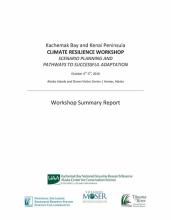
Climate change impacts in Alaska are more pronounced than in other regions of the United States. These impacts are well documented in the Kenai Peninsula, where communities are coping with a variety of impacts related to a warming climate. These include reductions in wetland areas, glacial ice coverage, and freshwater availability as well as increases in temperature, ocean acidification, and harmful algal blooms. Although efforts to document these changes can create a long-term, local strategy for climate change adaptation, challenges such as the uncertainty of future climate change trajectories, the need for regional data synthesis, and limited capacity for interagency collaboration have presented barriers to effective climate change planning. A 2015 Science Transfer project led by the Tijuana River and Kachemak Bay Reserves aimed to address these challenges by helping coastal communities on the Kenai Peninsula plan for a changing climate.
This document summarizes the first of two workshops hosted by the project team, the "Scenario Planning and Pathways to Successful Adaptation" workshop held on October 4-5, 2016 in Homer, Alaska. This workshop proceedings document includes the list of workshop attendees, agenda, and summary of workshop proceedings.